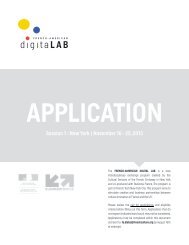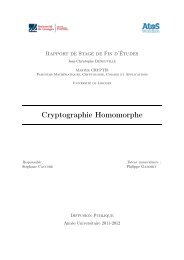REX
BD16_REX
BD16_REX
You also want an ePaper? Increase the reach of your titles
YUMPU automatically turns print PDFs into web optimized ePapers that Google loves.
Retours d’expériences Big Data en entreprise<br />
MarkLogic Server delivers content that is formatted and organized to end-users’ specifications. It can automatically<br />
create summary documents that extract relevant content across entire collections. MarkLogic is the basis of<br />
self-service publishing systems that enable customers to assemble their own information collections. Content repurposing<br />
is vital when multiple variants of a document are drawn from common materials. For example, a section<br />
of a research article may be combined with different content for Internet portals, print journals, grant applications,<br />
reference manuals, and textbooks. In another example, a master technical document about an aircraft may be excerpted<br />
to form manufacturing instructions, maintenance manuals, pilot briefing books, and training presentations.<br />
CONTENT DELIVERY<br />
When documents are ready to be published, syndicated, or otherwise delivered, they must go through an output<br />
formatting and rendering process. Preparing the same content for use in a textbook and a magazine means dealing<br />
with different document organizations, formats, and layouts. Meanwhile, publishing the same content for a Web<br />
portal, on-demand PDF, or handheld document reader requires further output rendering.<br />
MarkLogic Server provides the services needed for delivery of content that is optimized for multiple output formats,<br />
media, and devices. It also provides a content processing framework that offers custom content processing<br />
pipelines to coordinate multi-step production processes. The content processing framework has a Web services<br />
interface for easy integration of third-party tools and applications, enabling MarkLogic Server to be seamlessly<br />
integrated into existing business processes to create efficient content delivery systems.<br />
CUSTOM PUBLISHING<br />
Custom publishing is the on-demand assembly and production of documents from existing content. With a custom<br />
publishing system, users can build a custom document, book, article, newsletter, or collection of articles simply by<br />
“snapping” together content components from different sources.<br />
MarkLogic Server provides the services that enable content to be located, selected, and then assembled into a<br />
complete book or whatever format is required.<br />
SEARCH AND DISCOVERY<br />
Traditional enterprise search engines can often prove useful, especially when you know exactly what you are looking<br />
for. All too often, however, the potential matches are too numerous to even review. Furthermore, a user may not always<br />
know what he or she wants to find. MarkLogic Server provides extensive enterprise search capabilities (i.e. phrase,<br />
Boolean, wildcard, proximity, parametric, range searches) and language processing features (i.e. stemming, thesauri,<br />
spell checking). All of these features are implemented in a platform that can scale to handle terabytes of content.<br />
Figure 3: MarkLogic Server vs. Enterprise Search Engine<br />
INFOTRENDS’ PERSPECTIVE<br />
The Oxford University Press story is an excellent example of a company that made an infrastructure investment in<br />
a standardized XML publishing system that enhanced its ability to quickly develop new products while also reducing<br />
costs. The Mark Logic-based publishing platform enabled OUP to develop new projects in less time than it had<br />
taken to produce one-off projects. This directly translates into a better utilization of resources, the ability to respond<br />
more rapidly to changing market conditions, and the flexibility to respond to new requirements and content in the<br />
future. XML-based publishing solutions are gaining favor as customers and their vendors realize that information<br />
consistency is critical and metadata is paramount for a wide range of publishing projects. In fact, content- centric<br />
applications that assemble and distribute content through multiple touchpoints using open standards such as XML<br />
are no longer in the minority. OUP’s willingness to grapple with its online publishing problem using an XML-based<br />
publishing approach that is built on MarkLogic Server will enable the company to better serve customers in the<br />
future as their information needs continue to evolve.<br />
Mike Maziarka, Craig Cline<br />
Document réalisé par la Société Corp Events - Janvier 2015<br />
55







